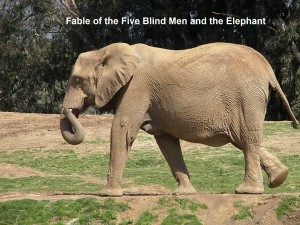Part One: Introduction
Most of us have heard the old fable about five blind men who attempt to identify an elephant by touching different portions of its body. The first blind man feels the trunk and concludes the elephant is a snake. The second examines a leg and declares the elephant is a tree. The third touches the tail and claims the elephant is a rope. The fourth probes the elephant’s side and believes it to be a house. Finally, the fifth blind man handles the elephant’s ear and asserts that the elephant is a fan.
Two aspects of this story parallel the problems we encounter when searching for religious truth. First, the five blind men’s physical handicap can be likened to the blindness many people have due to erroneous worldviews. The five men thought they had discovered truth (identified accurately what they were feeling), but instead each interpreted reality (the elephant) differently because their worldview filter (blindness) prevented reality from being known. If the elephant represents religious truth (i.e. Christianity), then what the five blind men thought the elephant was (tree, rope, etc.) represents false religious views. A worldview filters reality according to its own presuppositions, and if the presuppositions are false, truth—religious or otherwise—will be distorted.
The five blind men were limited in their search for truth to just feeling. Lacking a more accurate test for truth (such as sight), or some means to verify their conclusions, it would have been virtually impossible for any of the blind men to have actually discovered that they were touching an elephant rather than a snake, tree, rope, house, or fan.
Like the elusive elephant, religious truth-claims are not readily subject to verification. In order to discover religious truth, it is vital that we identify and utilize the best truth-tests available. Because some methods for determining truth are not applicable to religious truth, we must also seek ways to confirm religious truth-claims through rational and objective methods. Without such methods, there would be no way to ascertain which religion, among all contenders, possesses absolute truth.
What methods for acquiring truth (truth-tests), if any, are applicable to religious truth and which, if any, are subject to objective verification? Many truth-tests are relied upon by non-Christian religions as the basis for their truth-claims. If it can be shown that these tests are not applicable in the area of religious truth, it follows that the truth-claims resting upon them will likely be erroneous. Demonstrating the inadequacy of these tests, as they relate to religious truth, is a powerful argument against non-Christian worldviews. If a religion’s source of truth is unreliable, its truth-claims crumble.
Ultimately, religious truth must be revelational. God can’t be known by human reasoning alone. Indeed, God can’t be known at all unless He chooses to reveal Himself. Religions may claim divine revelation, but they must be verified. So in order to determine whether or not a particular religion’s truth-claims are divine revelation requires that we analyze their means for acquiring truth. ©
Next week we will begin to survey the various ways many religions seek to substantiate their truth-claims. We’ll begin with custom, tradition, and authority figures.
